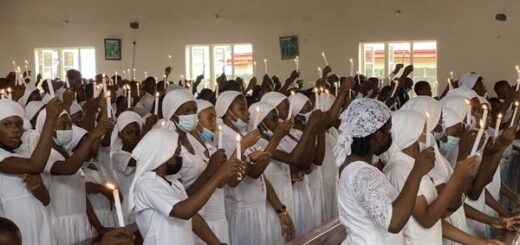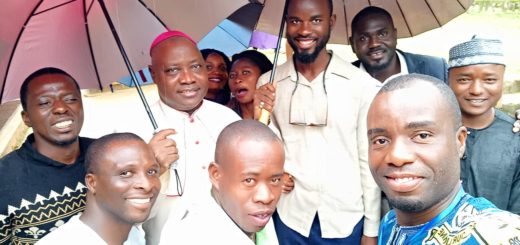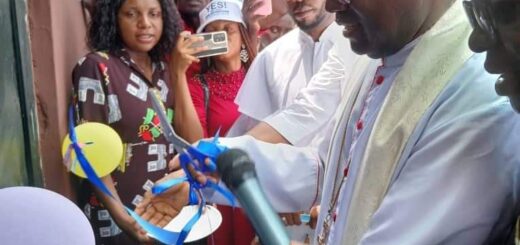Our Christian Mission to be Salt of the Earth and Light of the World
by ARCH BISHOP · February 5, 2023
5th Sunday in Ordinary Time, Year A, Holy Rosary Parish, Wuse, Abuja.
Homily by Archbishop I. A. Kaigama.
Readings: Is. 58:7-10, 1 Cor. 2:1-5, Mt. 5:13-16.
Our Christian Mission to be Salt of the Earth and Light of the World
It is a joy for me to make a pastoral visit to your parish this morning to pray with you and to confirm 114 candidates. I bring warm greetings to you the parish priest and Vicar for Pastoral Areas, Fr. Francis Kale, your assistant, Fr. Peter Ogu, the resident priest, Fr. Solomon Dankaro, the parish pastoral council, and indeed all the parishioners of Holy Rosary Parish, Wuse.
Our liturgy today challenges us to be good, committed, faithful and active Christians through our words, actions and interactions. Jesus makes it very clear in the gospel that His disciples are expected to be “salt of the earth” and ‘light of the world’ (cf. Mt. 5:13-14).
The exiled Jews who returned from Babylon were eager for a quick restoration of their fallen Jerusalem but for them the process was too slow. Prophet Isaiah in the first reading made them realize that their social progress and political stability were tied to bringing light to others by alleviating the sufferings of the poor, being just; “sharing bread with the hungry, sheltering the homeless and clothing the naked” (cf. Is. 58:7).
As Christians, our light can only shine through our good deeds. We are expected to do good to others, even when it costs us suffering. The prophet shows us that God always answers the prayers of those who are generous and heals them in their own moments of pains and misery. We need more generous and selfless people in our country to fix the issue of poverty complicated by corruption.
It is mind boggling that in many parts of Nigeria many people are living in great poverty. Yet we see the display of affluence by the few who have access to public funds or during electoral campaigns, when they play with money, completely oblivious to the suffering of Nigerians. The gap between “the high and mighty” and “the low and downtrodden” ever keeps widening. OXFAM reported recently that three wealthy persons in Nigeria are wealthier than 83 million Nigerians put together!
In this month of our election when the political climate is getting heated up, those aspiring to occupy high political offices must be convinced that when they win, they will use their positions to bring relief to the needy, liberate the poor from poverty, since poverty is largely at the root of our insecurity and violence. They should revisit why Nigeria is an expert in consuming but very poor in production. Other than oil what else do we export? But we import everything ranging from tooth pick, matches, shoe polish, pencils to soft drinks. We have a poor production culture, which explains why our groundnut, cocoa and cotton related industries have collapsed. We cannot even refine our oil to meet our domestic needs!
In the second reading, Paul demonstrates how his presence among the Corinthians dispelled their darkness, not through eloquence or wise reasoning or sophistry, but through the word of God (1 Cor. 2:1-5), and his (Paul’s) actions. His labour of love bore fruits as the people came to believe in Christ, teaching us that our encounter with people must leave them better than we met them. We should be a mobile gospel, good news.
Let us ask God to increase our belief in Him; to practise more charitable deeds in His name and for His sake; to shun egocentric tendencies. Let us meditate on what St. Basil once said: “The bread which you do not use is the bread of the hungry; the garment hanging on your wardrobe is the garment of him who is naked; the shoes that you do not wear are the shoes of the one who is barefoot; the money that you keep locked away is the money of the poor; the acts of charity that you do not perform are so many injustices that you commit”.
In the Gospel, when Jesus compares Christians to salt and light, He expects His disciples to be virtuous and just and by their shining life to brighten our world darkened by evil. In the ancient Jewish times, salt was useful as a preservative long before the innovation of refrigeration to prevent meat or food items from decay. As salt, Christians are to make an impact on the world, preserving society from rot and further decay. Jesus challenges us today to inject the society with good deeds, modesty (cf. 1 Tim. 2:9), morality (cf. Eph. 5:3-12), honesty and integrity (cf. Jn. 8:44-47). In calling us “light”, John 1:5 reminds us that: “the light shines in the darkness and the darkness cannot overcome it”. Therefore, the challenge before us is to shine where there is moral and spiritual darkness or even physical or environmental decay.
As the Holy Father, Pope Francis, concludes his first visit to the Democratic Republic of Congo and South Sudan, countries with large Christian populations, we hope the Christians there will renew their determination to be truly the salt and light of their countries. The Holy Father knelt before the leaders of the warring factions in the Vatican in 2019 during a spiritual retreat and kissed their feet and asked them to remain in peace. Today he is physically there. May his presence bring about a conversion of heart so that all will turn their swords into ploughshares. It is our firm conviction that his presence and the blessing he bestows on these nations will diffuse to the entire continent of Africa so that we can live devoid of bloodshed and violent conflicts.
Today, the candidates for confirmation will hold their lighted candles, an act proclaiming that we are children of light and this light must be kept burning brightly so that the poison of sin does not extinguish it. I urge you the entire parishioners of Holy Rosary Parish, Wuse, to walk in the light of Christ so that when He returns, He will find our light shining brightly.




